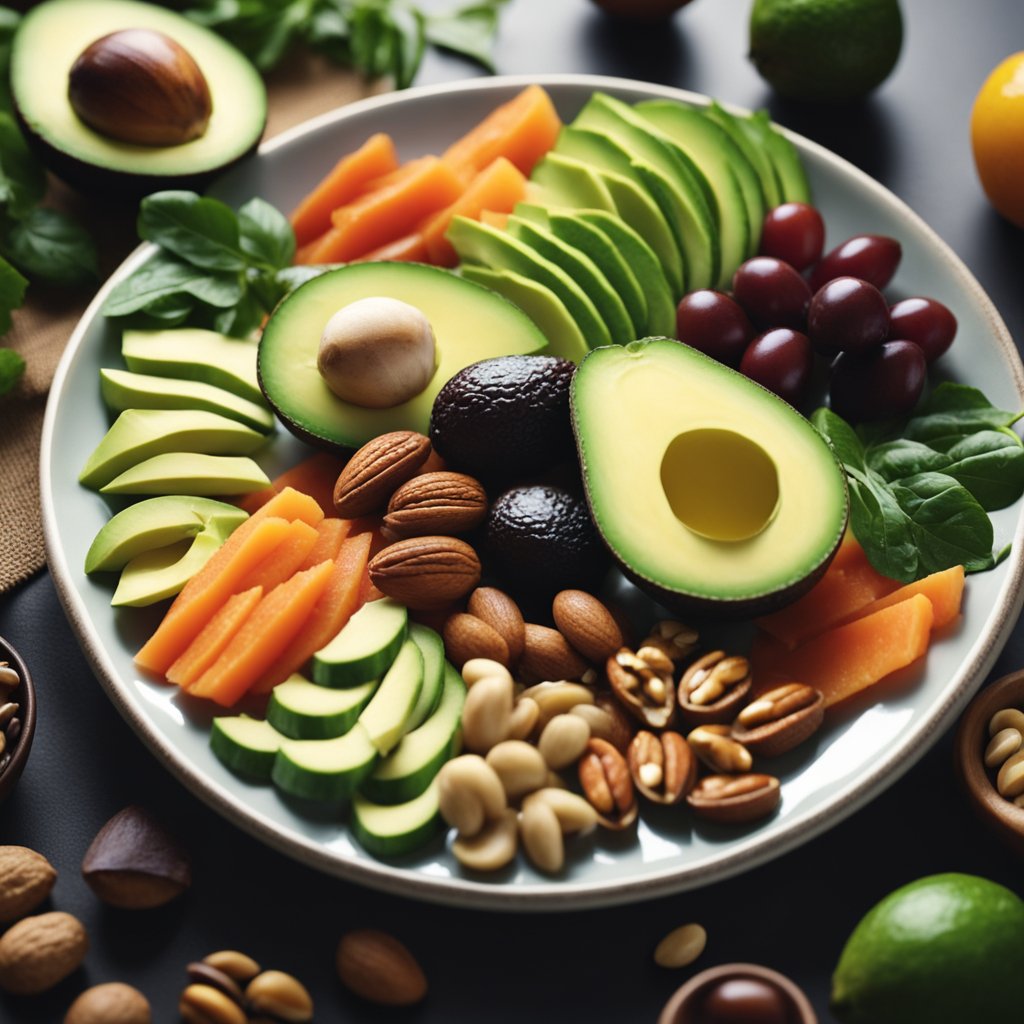In the realm of fitness and nutrition, there’s a lot to consider, and one crucial element often misunderstood is the role of dietary fat in nutrition. Fat is often viewed negatively, but it is actually an essential macronutrient. It gives us energy and plays a crucial role in our health.

To make informed decisions about your nutrition, it’s essential to grasp the different types of body fat. Many people consider unsaturated fats, found in fish, seeds, and nuts, to be the healthiest fats. These fats have the ability to lower cholesterol levels. On the flip side, saturated fats, present in animal products like dairy and meat, can be harmful in excess. You should avoid trans fats, which are often found in processed food sources like margarine, as they are the most harmful.
Including healthy fats in your daily diet has many fitness and health rewards. It is beneficial for overall well-being. These fats give energy for workouts. They also reduce inflammation and improve brain function. You can improve your fitness results by making informed choices. These choices include the amounts and types of fat you consume. Maximize your nutrition plan as well.
Demystifying Fat in Nutrition
Fat is an essential macronutrient. It provides energy and supports body function. During exercise, it serves as a primary energy source. This is especially true for low-intensity and prolonged activities. In addition to energy, fat plays a vital role in nutrient absorption, cell function, and hormone production.
Understanding the Fat Hierarchy
Not all fats are created equal. Fish, avocados, and various nuts contain unsaturated fats. People consider them healthy. They aid in maintaining optimal cholesterol levels and reducing the risk of heart disease. On the contrary, saturated and trans fats should be limited to maintain a healthy diet, as they increase the chances of heart disease. Saturated fats are in animal products like butter and fatty meats. Trans fats hide in processed food sources such as baked goods and fried foods.
Balancing Fat Intake
While fats in nutrition are essential, consuming too much can lead to unwanted weight gain and health issues. Balancing fat intake with protein and carbohydrates is crucial for maintaining a healthy body weight. Understanding the role of fats in nutrition is vital for a balanced diet. Including healthy fats can improve overall health and workout results. Limiting saturated fats is important too. Eliminating trans fats reduces the risk of chronic diseases.
The Energy Source Within
In the vast landscape of fitness nutrition, fat serves as a primary source of energy for the human body. It holds the title of the densest source of energy, boasting more than twice the calories per gram compared to protein or carbs. Fats primarily provide energy through the oxidation of fatty acids, a process occurring in the mitochondria of cells. This process, known as aerobic metabolism, efficiently produces ATP, the energy equivalent in your body.
The Backup Plan
Having a backup plan is always wise, and your body is no exception. During a low-carb diet or prolonged exercise, when you have low carbs, your body breaks down stored fat. The body uses the stored fat as an source of energy by turning it into fatty acids and ketones. This alternative or backup fuel source ensures your body has energy when needed.
Understanding Fatty Acids
Fatty acids are the building blocks of fats. They come in three main types: saturated, monounsaturated, and polyunsaturated. Polyunsaturated fatty acids are crucial for brain function and reducing inflammation. They are further divided into omega-3 and omega-6. These acids also help prevent cardiovascular disease. Optimal sources include fatty fish, seeds, and nuts.
Finding the Right Balance
Maintaining a balanced nutritional plan is critical for good fitness and health. Choosing healthy fats and protein sources is essential. Aim for more omega-3 fatty acids and limit omega-6 intake for a well-rounded approach to nutrition.
How Much is Enough Fat in Nutrition ?
Despite the hype suggesting so, people should not avoid fats. They have a pivotal role in maintaining energy, well-being, and metabolic functions. Fitness enthusiasts and athletes aim to optimize body composition and performance. They prioritize striking the right balance in their nutritional plan. Overall health is also an important factor for them.
General Recommendations for Healthy Fat Intake
The American Heart Association recommends a daily fat intake of 20-35% of total calories for healthy adults. For someone on a 2000 calorie diet, this translates to 44-77 grams of fat per day. Opt for healthy sources like fatty fish, avocados, nuts, and seeds, rich in omega-3 fatty acids.
Tailoring Recommendations to Your Body
Individuals with a high fitness level may need to adjust their fat intake based on body type, body weight, and activity level. Strength athletes may benefit from reducing fat intake to stimulate muscle growth. On the other hand, endurance athletes may need more fat for energy. As a general rule, aim for 0.5-1 gram of fat per pound of body weight.
Balancing Fats with Other Macronutrients
Maintaining balance in fat intake with proteins and carbohydrates is crucial. Proteins help muscles grow and heal. Carbohydrates give energy when being active. Including fats in your nutritional plan is essential, aiming for 20-35% of total daily calories from healthy sources.
What Do Fats Have That I Want?
Including fats in your nutrition plan comes with numerous advantages. Fats give you energy for workouts and daily activities. They help absorb vitamins and aid in muscle recovery after exercise. Choosing the right kinds of fats is important. Unsaturated fats can be found in nuts, fish, and avocados. They help with satisfaction and prevent overeating.
Achieving Bigger Muscles and a Thinner Waist
The inclusion of healthy fats in your nutritional plan can contribute to increased muscle mass and reduced body fat levels. Fats fuel workouts, aid in muscle recovery, and regulate appetite, preventing overeating.
It’s a Win-Win
Incorporating healthy fats can improve blood pressure. It can also improve heart health by reducing inflammation. If you want to change your diet, talk to a healthcare professional. They can be a doctor or a registered dietitian.

Frequently Asked Questions
Q: What role do fats play in a fitness-focused diet?
A: Fats are important for fitness as an energy source. They also support hormone production, aid nutrient absorption, and maintain cell function. They are vital for athletes and fitness enthusiasts to support performance and recovery.
Q: What are the best sources of healthy fats for someone on a fitness journey?
A: Optimal sources of healthy fats include avocados, nuts, seeds, fatty fish like salmon, and oils like olive oil. These sources contain essential omega-3 and omega-6 fatty acids. Omega-3 and omega-6 fatty acids are beneficial for heart health. They also help reduce inflammation and aid in muscle recovery.
Q: Is it important to track fat intake for fitness goals, and if so, how much fat should be consumed?
A: Monitoring fat intake is essential, focusing on the quality of fats consumed. A balanced diet should include about 20-35% of daily calories from healthy fats. Individual needs may vary based on activity level, goals, and overall diet.
Q: Can consuming fats help in weight loss or muscle building?
A: While fats are calorie-dense, consuming healthy fats in moderation can aid in weight management. They give a feeling of fullness, making you feel satisfied longer. This may help you eat fewer calories in total. Additionally, certain fats can assist in muscle repair and growth after workouts.
Q: What are the differences between various types of fats and their impact on fitness and health?
Understanding the differences between saturated and unsaturated fats is important. It is also important to know what trans fats are. Saturated fats, found in animal products and some oils, should be limited. Unsaturated fats are good for heart health and overall well-being. Omega-3s and 6s, in particular, are beneficial. The fats have positive effects on the heart and overall health. Trans fats, often found in processed food sources, should be avoided due to their negative impact on health.
